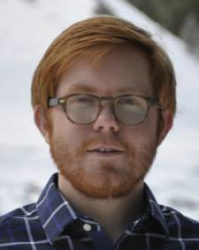This essay is part of our July 2019 Uncertain Future Forum on the topic: “If collapse is imminent, how do we respond?” The first week featured our contributors’ responses to the topic; this second week features their reactions to—and inspirations sparked by—each other’s essays. We invite you to comment below, and to read the other essays here.

Taylor Brorby
My family are foot soldiers in the fossil fuel army. From the Powder River Basin and the Bakken oil boom to the Canadian gas fields and coal power plant boilers, my family has dug, stripped, fracked, and drilled across the continent. And somehow my family has produced an environmentalist.
Growing up in coal country in south-central North Dakota, I swam in a lake that never freezes. A lake in North Dakota that never freezes. Nelson Lake, a manmade reservoir, cools the coal-fired turbines of Minnkota Power, the power plant where my mother spent the entirety of her working life, and whose turbines were fed coal stripped by BNI Coal, where my grandfather—her father-in-law—spent his entire career. My father ended his career at Dakota Westmoreland, a coal mine near Beulah, North Dakota, before it shut down due to economic forces. Three generations on my father’s side and two on my mother’s side, thirteen members in all, have worked in fossil fuels. My great-great-grandpa Brorby is buried in Lignite, North Dakota. Coal courses through my veins.
In 2006, the year I left for college, the Bakken oil boom—the third boom in North Dakota’s history—began to destroy my home. Suddenly, everyone in the country knew where North Dakota was: it is the least-visited state and, suddenly, it was on the map. Towns doubled, and in some cases quadrupled, in size. North Dakota, lit by the flaring of natural gas, was the planet’s largest bonfire, visible from space and giving off more light pollution than Minneapolis–St. Paul.
In 2013, I traveled back to North Dakota to teach creative writing workshops in towns impacted by the oil boom. I began to write in earnest—poems, essays, op-eds—and travel around the country, while a full-time graduate student, speaking to any college class or book club that was willing to listen to what I had seen. Oil, chemical, and saltwater spills continued; Native women kept disappearing, the number not known—because the United States doesn’t keep records for missing Native Americans. Drug trafficking increased. In 2016, a Duke University study concluded that the Missouri River was radioactive. My nephews swim in Lake Sakakawea—the frontline reservoir for the Bakken oil boom.
In 2014, while living in Ames, Iowa, as a graduate student, it was announced that a large pipeline from North Dakota, capable of carrying twenty-five million gallons of oil per day, would cut through Story County—the county where I then lived. My home was coming home again.
I began attending community meetings. I traveled around Iowa, speaking to groups about the Bakken oil boom—about what Bakken oil, when spilled, does to farmland. I started to have nightmares about the pipeline being built, about it breaking—just for an hour—and spilling a million gallons of oil on Iowa soil.
In 2016, the week before my last year of graduate school, I traveled home to North Dakota to attend the protest at Standing Rock, to learn how to fight, peacefully, from Native brothers and sisters. Two weeks later, on August 31, near Boone, Iowa, I and twenty-nine other people were the first Iowans arrested for protesting the Dakota Access Pipeline. I had bit the hand that fed me.
In the time in which we now live, we know that coal, oil, and natural gas do one thing well: they weird the planet. We know we need to invest in the perennial economy—an economy that runs on sunshine and wind power, an economy that creates healthy, stable careers rather than jobs. We need an economy that takes care of the home instead of ruining our only home.
And so, we need to end my family’s way of making money. We need to get off of our suicidal path of greed and fear, and destroy an economy based on genocidal white male patriarchy. To dig, strip, frack, mine, and drill is sinful—it is insulting to our intelligence, and it’s an insult towards our better creativity. We are in the bottleneck of climate catastrophe: At no other time in our species’ existence has there been a greater need for more imaginative, restorative, and spiritual ways of living with the planet.
We will need to train the fossil fuel foot soldiers to become foot soldiers in the perennial economy. After all, before de-friending my sister on Facebook for her comments on fossil fuel, a cousin remarked that coal has been good for our family. The next week his uncle was part of the group of coal miners in Gillette, Wyoming, who discovered the fossil fuel industry does not have community interests at heart: At the end of June, two coal mines shut down overnight in Gillette. Already, a large insurance company has announced it will no longer provide insurance to coal mines. We need a windfall of clear-cutting the fossil fuel economy, and it will not be easy—the captains of industry will not go away without a fight.
When I was arrested for protesting the Dakota Access Pipeline, I thought of my nephews, of their small bodies in polluted water. I thought of my own small body, growing up, swimming in Nelson Lake. I thought of the protestors at Standing Rock, the farmers in Iowa. I thought of my community. I did not think of captains of industry, because they are not a part of our communities, a part of our shared livelihoods—they are the kings with titles such as CEOs rather than crowns.
The battle has not changed; it’s time to rally the troops. It’s time to bite the hand that’s fed us.
Taylor Brorby is contributing editor at North American Review. He is the author of Crude: Poems, Coming Alive: Action and Civil Disobedience, and co-editor or Fracture: Essays, Poems, and Stories on Fracking in America. He is currently at work on books related to the Bakken oil boom, growing up gay on the Northern Great Plains, and being a diabetic.





